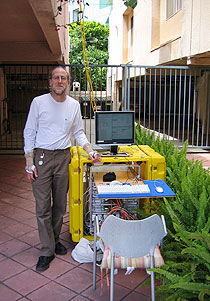June 27, 2005
SlugGo wins computer go tournament
By Tim Stephens
SlugGo, a computer program designed at UCSC to play the ancient Chinese game of go, entered its first computer go tournament this month and came out on top.
 UCSC alumnus David Doshay with the computer cluster that SlugGo ran on to compete in a go tournament
in Los Angeles in May.
UCSC alumnus David Doshay with the computer cluster that SlugGo ran on to compete in a go tournament
in Los Angeles in May.
Photo courtesy of David Doshay
|
"We played against one of the top commercial programs, so we were pleased--we would not have been surprised to lose," said Charles McDowell, professor of computer science.
"We barely squeaked out a win. I was very surprised when I saw the final score," added David Doshay, a UCSC alumnus who is working with McDowell on the project. "We have been having a great deal of fun and success with the go playing program."
Doshay's Hierarchical Systems Research Foundation provided the powerful cluster of Apple Xserve G5 computers used to run SlugGo (see earlier story).
McDowell, Doshay, and several students have been developing SlugGo as part of a project to design a software infrastructure that makes it easier to program computer clusters for parallel processing. Parallel processing speeds up the execution of a computer program by dividing it up and running multiple pieces of it simultaneously on separate computer processors.
"Parallel processing used to be the domain of specialists, but it is becoming more widespread, so we're trying to make it easier for the growing number of software developers who need to program parallel computers," McDowell said.
The computer go tournament was organized by the Kiseido Go Server (http://kgs.kiseido.com), a web site where go enthusiasts can compete against players from around the world. Kiseido organizes tournaments for people as well as computers. In May, SlugGo was one of two computer programs invited to compete in a human tournament. The UCSC program only won one game, but fared better than the other computer program in the tournament, which didn't win any games.
"I look at being invited to enter a human tournament at all as quite a milestone in the history of computer go," said Doshay, who traveled to Los Angeles with a cluster of computers to compete in the tournament.
Go poses much greater challenges for computers than chess. Currently, the best computer go programs only play at the level of a moderately good amateur, McDowell said.
SlugGo is built largely on the foundation of an open-source software program called Gnu Go. Students who have worked on the project most recently include undergraduate Brian Chavez, who just earned his B.S. in computer science, and graduate student Kai Wang, who just earned her M.S. in computer science.
"There are a number of computer science challenges that make the go program a useful exercise for us," McDowell said. "Now that we've got it to where it's playing well, it's actually fairly addictive to try to keep making it better."
 Email this story
Email this story
 Printer-friendly version
Printer-friendly version
 Return to Front Page
Return to Front Page